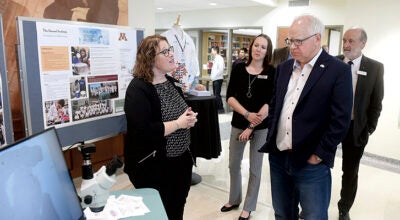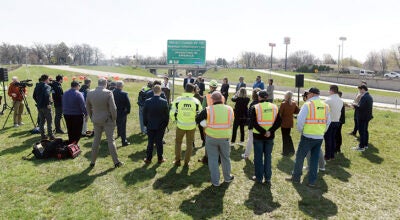Strain on federal highway fund colors Minnesota roads debate
Published 4:00 pm Saturday, February 21, 2015
ST. PAUL — In making his case for higher state transportation taxes, Gov. Mark Dayton regularly points to a slowing flow of money from Washington for highway construction as a reason Minnesota taxpayers are stuck with a bigger burden.
“It’s not going to come from the federal government. It’s not going to come from the sky,” Dayton bluntly told a delegation from Bemidji during its annual Capitol lobbying day. “So it’s going to have to come from our pockets.”
Federal figures compiled by The Associated Press bear that out, showing the total amount of money available to all states from the Federal Highway Trust Fund has declined 3.5 percent during the five-year period ending in 2013, the latest year for which complete numbers were available. In Minnesota, the drop is even more severe on its face — 33 percent — but there’s much more to the story.
The 2007 collapse and swift rebuild of the Interstate 35W bridge in Minneapolis caused Minnesota’s federal highway grants to top $1 billion, but annual allocations from the federal government have steadily receded since. In other years, competitive transportation grants tied to specific projects temporarily added to the state’s base allowance.
In fiscal year 2013, Minnesota reaped $689 million from the federal trust fund, or about $127 for every resident. That was about even with the national average of $126 per capita, but slightly lower than neighboring Wisconsin ($131) and Iowa ($153). With their small populations, North Dakota and South Dakota fared substantially better in the per-capita ratings even if their slice of the pie was far less.
Five years earlier, Minnesota was far ahead of Wisconsin and Iowa in its yearly allotment and its per-resident take. But that was due mostly to the burst of $270 million Congress approved that year in response to the I-35W tragedy.
As costs increase for building and repairing roads, Minnesota officials and transportation planners face a choice: scale back their annual construction programs or turn inward for money to narrow the gap.
Dayton is pressing for a new 6.5 percent wholesale tax on gas, which would be on top of the current 28-cent-per-gallon charge. That, along with higher vehicle registration fees and the sale of more bonds, would generate about $6 billion in the next decade to repair or replace 2,200 miles of roadway and 330 bridges.
Charlie Zelle, Dayton’s commissioner of transportation, said there are few indications the federal government’s commitment to state infrastructure needs will change anytime soon.
“This debate is certainly one that’s national,” Zelle said. “But we know we have to take care of business here in Minnesota because as time passes not only do we lose ground in terms of time, but it becomes much more expensive to deal with these issues of deterioration.”
It’s turning out to be a difficult sell.
Rep. Tim Kelly of Red Wing, the leading House Republican on transportation matters, agrees “federal funds are lacking” but he’s not convinced raising state taxes is the right course. Majority House Republicans plan to seek a quick shot of new transportation funding this session, with a sizable amount drawn from a projected state budget surplus.
But Kelly is dropping hints that GOP members will wait until the 2016 session to figure out a long-term finance plan. Kelly said it’s his preference to defer action until the sides come to consensus on what the true need is.
“It’s irresponsible to suggest we can do that in the course of eight weeks, 10 weeks, even two months when we’re talking about a 10-year plan,” Kelly said. “If we reach agreement on the need, then it’s a matter of finding the revenue to meet the need.”





